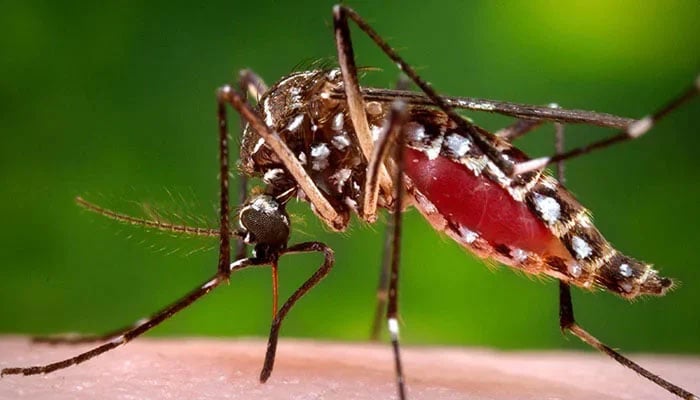‘Time to check hatching of mosquitoes’ eggs to avoid dengue, malaria’
Rawalpindi: The weather conditions in almost all parts of the Punjab province along with this region of the country are getting suitable for hatching of mosquitoes’ eggs and larval growth and it is the right time to take certain preventive measures including elimination of possible breeding sites of mosquitoes to avoid incidences of malaria and dengue fever in the days to come.
The teams of district health department Rawalpindi have already started finding larvae of both ‘aedes aegypty’ and ‘aedes albopictus’, the vectors that cause dengue fever, in abundance. Data collected by ‘The News’ on Thursday has revealed that in the last two days, the teams of District Health Authority Rawalpindi have found larvae of dengue fever vector from as many as 217 houses and 107 spots.
It is important that the larvae of dengue fever vectors have so far been detected in as many as 1781 houses and at 407 spots in the district and it hints towards a possible spread of dengue fever in the coming weeks. Health experts say that to avoid a possible outbreak of dengue fever, it is time for individuals to mechanically destroy all possible breeding sites of mosquitoes particularly inside homes and offices. Studies have shown that the best preventive measure to avoid spread of dengue fever for areas infested with mosquitoes ‘aedes aegypti’ and ‘aedes albopictus’ is to eliminate the mosquitoes’ egg laying sites – called source reduction. Lowering the number of eggs, larvae and pupae will help reduce the number of emerging adult mosquitoes and the transmission of the disease.
Experts say that the recent rain spells and a significant rise in mercury level in the country would certainly create possible breeding sites for larvae of mosquitoes putting the population at risk of facing a possible outbreak of dengue fever in the coming weeks while causing spread of malaria at the time. The spread of the infections, however, can be avoided if proper action is taken well in time by both the concerned government authorities and individuals. In the existing weather conditions, water accumulation and even moist places can provide a favourable place for the female mosquitoes to lay eggs. The mosquitoes have three water dependent stages that are eggs, larva and pupa and the last aerial stage of adult mosquitoes. The life span in each stage depends on several factors like temperature, humidity and availability of water.
Factors including congested living, continued presence of solid waste, trash, and poor water storage practices play an important role in the spread of both malaria and dengue fever. The incidences of dengue fever and malaria can be avoided by avoiding breeding of mosquitoes and by controlling their growth and it is time for the public to take measures religiously to eliminate all possible breeding sites of mosquitoes from houses and offices.
Experts say that the eggs laid down by mosquitoes months back would start hatching at the time and the unchecked larval growth would result in greater density of mosquitoes. The recent rains would provide water to the eggs of mosquitoes increasing the chances of growth of larvae and to avoid it, immediate removal of water accumulation is needed. Experts say that people must be aware of the fact that the elimination of possible breeding sites of mosquitoes inside homes and offices can reduce the risk of a possible outbreak of dengue fever to a significant extent.
-
 Travis Kelce Plays Key Role In Taylor Swift's 'Opalite' Remix
Travis Kelce Plays Key Role In Taylor Swift's 'Opalite' Remix -
 How Jennifer Aniston's 57th Birthday Went With Boyfriend Jim Curtis
How Jennifer Aniston's 57th Birthday Went With Boyfriend Jim Curtis -
 JoJo Siwa Shares Inspiring Words With Young Changemakers
JoJo Siwa Shares Inspiring Words With Young Changemakers -
 James Van Der Beek Loved Ones Breaks Silence After Fundraiser Hits $2.2M
James Van Der Beek Loved Ones Breaks Silence After Fundraiser Hits $2.2M -
 Disney’s $336m 'Snow White' Remake Ends With $170m Box Office Loss: Report
Disney’s $336m 'Snow White' Remake Ends With $170m Box Office Loss: Report -
 Travis Kelce's Mom Donna Kelce Breaks Silence On His Retirement Plans
Travis Kelce's Mom Donna Kelce Breaks Silence On His Retirement Plans -
 Premiere Date Of 'Spider-Noir' Featuring Nicolas Cage Announced
Premiere Date Of 'Spider-Noir' Featuring Nicolas Cage Announced -
 Pedro Pascal's Sister Reveals His Reaction To Her 'The Beauty' Role
Pedro Pascal's Sister Reveals His Reaction To Her 'The Beauty' Role -
 Kate Middleton Proves She's True 'children's Princess' With THIS Move
Kate Middleton Proves She's True 'children's Princess' With THIS Move -
 Paul Anka Reveals How He Raised Son Ethan Differently From His Daughters
Paul Anka Reveals How He Raised Son Ethan Differently From His Daughters -
 'A Very Special Visitor' Meets Queen Camilla At Clarence House
'A Very Special Visitor' Meets Queen Camilla At Clarence House -
 Jodie Turner Smith Shares One Strict Rule She Follows As A Mom
Jodie Turner Smith Shares One Strict Rule She Follows As A Mom -
 Hailey Bieber Reveals KEY To Balancing Motherhood With Career
Hailey Bieber Reveals KEY To Balancing Motherhood With Career -
 Photo Of Jay-Z, Other Prominent Figures With Jeffrey Epstein Proven To Be Fake
Photo Of Jay-Z, Other Prominent Figures With Jeffrey Epstein Proven To Be Fake -
 Hillary Clinton's Munich Train Video Sparks Conspiracy Theories
Hillary Clinton's Munich Train Video Sparks Conspiracy Theories -
 Fans Slam Talk Show Host For 'cringe' Behavior In Chris Hemsworth Interview
Fans Slam Talk Show Host For 'cringe' Behavior In Chris Hemsworth Interview




